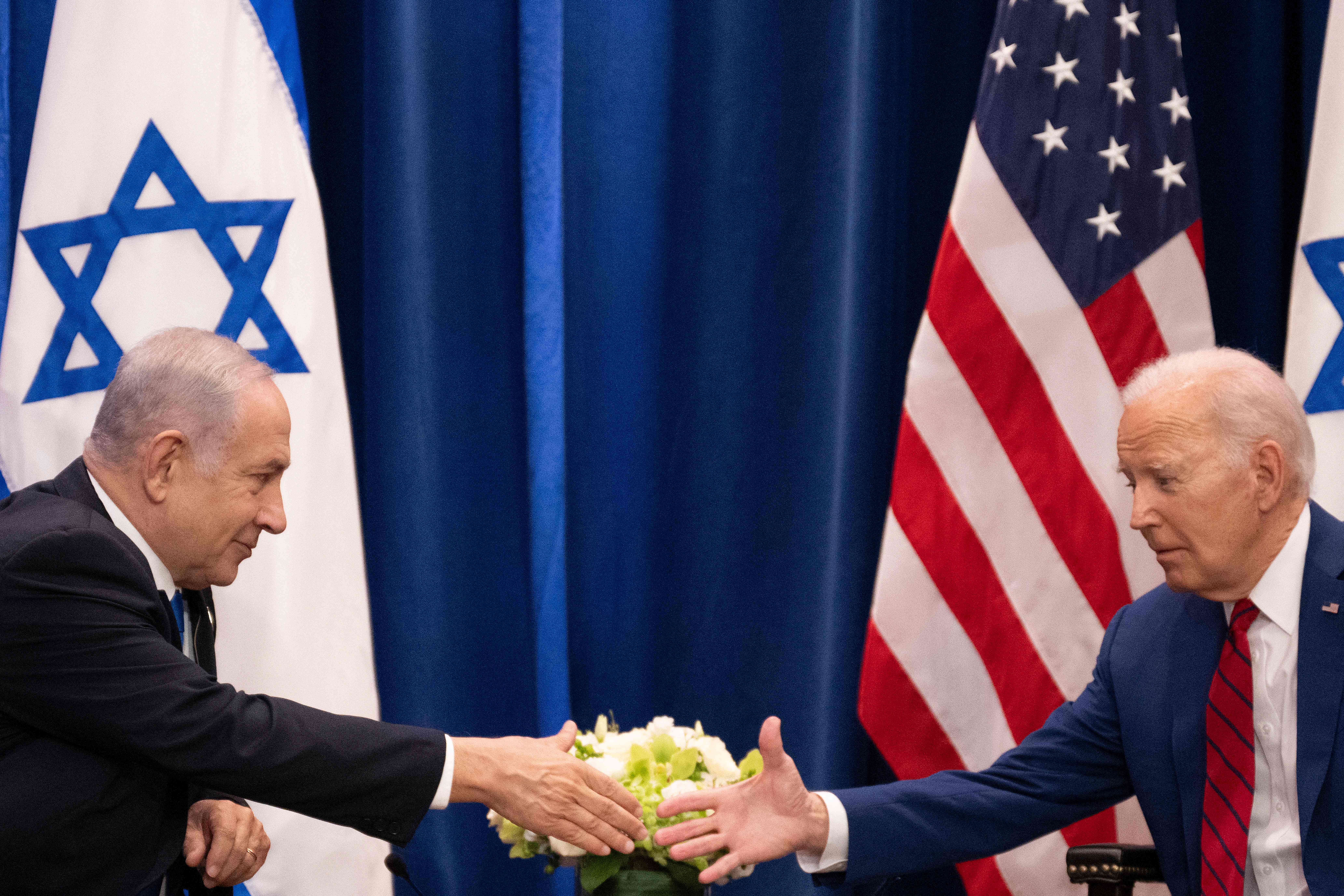Why Biden has ‘no alternative’ to Netanyahu
The two men are refocused on something that has always united them: ensuring Israel’s security and long-term survival.


The Palestinian militants who attacked Israel this weekend have done Benjamin Netanyahu a much-needed political favor: They’ve revived his foundering relationship with Joe Biden.
The decadeslong friendship between the Israeli prime minister and the U.S. president had been sorely tested in recent months as Biden urged Netanyahu and his far-right government to abandon efforts to overhaul Israel’s judiciary in ways many Israelis fear will destroy their democracy. Divisions in the Democratic Party over Israel continue to grow. Long gone were the days when Biden expressed outright “love” for Netanyahu — instead, Biden even delayed inviting him to the White House for months.
But the astonishing, multipronged attack by Hamas militants is sure to cast aside those frictions for now. Instead, the two men are refocused on something that has always united them: ensuring Israel’s security and long-term survival. And they’re doing so as both face complex political shifts at home — with their leadership on the line, and the prospect of a second Donald Trump presidency looming.
The crisis follows months of rising Israeli-Palestinian tensions, and as the Biden administration pursues a controversial peace deal in the Middle East that would establish Saudi-Israeli diplomatic ties. Yet the attack appeared to surprise both the Middle East and Washington.
Current officials were struggling to understand its scope and implications, even as it was already affecting Israel’s chaotic domestic politics as well as U.S. presidential campaign politics. (Netanyahu reportedly proposed bringing the opposition into an emergency unity government.)
In the short term, it’s likely to unite Israelis riven by the fight over the court while increasing Republican pressure on Biden to do more to support Israel and weaken Iran, which backs Hamas. Pressure that Biden has felt from progressive Democrats to be tougher on Israel could fade temporarily.
In any case, Biden is likely to have little leverage anytime soon to pressure Netanyahu to ease up on any retribution against the Palestinians.
For now, Biden “really has no alternative but to be extraordinarily supportive of Netanyahu,” said Aaron David Miller, a former U.S. official involved in Middle East peace negotiations.
That dynamic was on display Saturday, if you read between the lines of Biden’s statement after he spoke to Netanyahu as the conflict unfolded. Biden stressed his support for Israel — but he didn’t mention Palestinian rights or suffering under Israeli occupation, avoiding some of the caveats U.S. presidents often include when such crises erupt.
“My administration’s support for Israel’s security is rock solid and unwavering,” Biden said, condemning the assault as an “appalling” terrorist strike.
In its readout of the call, Netanyahu’s office stressed that Biden had “emphasized that the U.S. stands alongside Israel.” Netanyahu, the statement said, “made it clear that a forceful, prolonged campaign — which Israel will win — is necessary.”
The attack by militants of Hamas, the Palestinian network that controls the Gaza Strip, was one of the biggest on Israel in 50 years. It came more than two years after another deadly conflagration between Israel and Hamas. This time the scope and sheer complexity — with militants firing a massive barrage of rockets, infiltrating multiple towns, hang-gliding into some areas and even reportedly taking hostages — were far more striking.
“This isn’t like past Hamas-Israel eruptions — this is orders of magnitude different,” Khaled Elgindy, an analyst with the Middle East Institute, said of the latest fighting. “I don’t think anyone knows what normal looks like after this.”
Current and former American officials, as well as analysts in Israel, stressed that there were too many unknown factors to make definitive long-term predictions.
But some said Biden is unlikely to stop Netanyahu from responding with intense force, such as a potential ground incursion into Gaza that could result in many civilian deaths, for a significant amount of time.
Hamas likely understood the risk of high bloodshed among Palestinians, but it may have other long-term goals. After all, if fighting drags on for many weeks or even months, the body count could eventually change the political dynamics in both the United States and Israel.
Netanyahu’s far-right coalition partners may insist on continuing the fighting. But Democrats and others worried about the civilian tolls in Gaza or beyond could over time urge Biden to pressure Netanyahu to wind down the operation. That could lead to fractures in Netanyahu’s political coalition.
“We’ve seen this before,” said Jon Alterman, a veteran Middle East analyst. “Israel has a window of opportunity. Israel will pound Gaza. Everyone will say they understand, terrorism, everything. After a while, people will say, ‘That’s enough.’ And there will be parts of Netanyahu’s coalition which will say no.”
While some in the political sphere called the Hamas attacks unprovoked, other observers noted it followed rising tensions between Israelis and Palestinians.
“That Hamas is willing to take this step knowing the massive death and destruction that Israel will inflict on Palestinians and on them as a movement is a sign of how unbearable the reality has become for Palestinians,” Elgindy argued.
Biden is at his core deeply pro-Israel, even if he doesn’t always agree with Netanyahu. The pair’s friendship has survived a number of bumps, including Netanyahu’s disdainful treatment of former President Barack Obama and his attempts to kill the Obama-backed Iran nuclear deal.
“I signed a picture for Bibi a long time ago,” Biden, using Netanyahu’s nickname, told an audience in fall 2014, when he was Obama’s vice president. “He’s been a friend for over 30 years. I said ‘Bibi, I don’t agree with a damn thing you say, but I love you.’”
The Israeli leader has alienated many of his own citizens, not only with his judicial overhaul efforts but also because he’s leading a far-right government that many Israelis believe will erode secular freedoms. For months, Israelis have been staging large protests against the judicial overhaul. Netanyahu also is facing corruption charges that have further damaged his image.
At the same time, Israel no longer has reliable bipartisan support in the United States. Growing numbers of Democrats, especially among progressives, have been willing to publicly question the unconditional U.S. support for Israel.
Israeli treatment of Palestinians, including its construction of settlements on lands claimed by the Palestinians for a future state, has increasingly alarmed Democrats. Netanyahu’s open embrace of Trump during his first term as president also unnerved many on the left. (Trump, in return, took numerous steps to support Netanyahu, including recognizing Jerusalem as Israel’s capital.)
U.S. politics are likely to play a growing role in any response to the crisis between Israel and Hamas as next year’s presidential election draws closer.
Republicans can use the latest conflagration to further attack Biden as not being sufficiently pro-Israel as well as being weak on Iran, a country that Israel views as an existential threat and which backs Hamas.
Trump, the Republican primary frontrunner, on Saturday accused Biden of funding the attacks on Israel. He appeared to be referring to a hostage exchange deal that gave Iran limited access to $6 billion of its previously frozen funds. U.S. officials fiercely denied that agreement played any role in the latest crisis.
Biden and his aides also have been pushing for a grand Middle East peace deal that could see Saudi Arabia and Israel establish a formal diplomatic relationship. That agreement would, in theory, have many parts, including a security pact between the United States and Saudi Arabia as well as measures designed to help the Palestinians establish a state.
Such a deal could establish a bulwark against Iran. Biden administration officials in private downplay reports that an agreement is imminent. But an Israel-Hamas war does not necessarily derail it and it would be historic if it became a reality.
For that to happen, and for Biden to go down in the books as a Middle East peacemaker, he’s going to need Netanyahu’s cooperation.
“Netanyahu stands at the center of both Iran, the crisis, and Saudi-Israel, the opportunity,” Miller said.
In his statement, Biden didn’t say he foresaw a lengthy fight as his Israeli counterpart predicted. He did, however, suggest that the pair would try to stay in sync.
“I will remain in close touch with Prime Minister Netanyahu,” Biden said.












